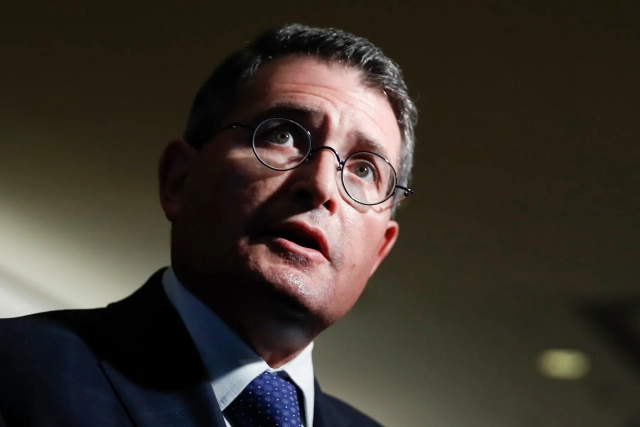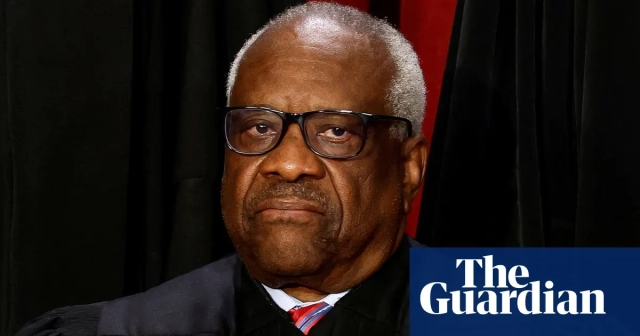Search
Items tagged with: Thomas
Through his role in securing the nominations of Clarence #Thomas, John #Roberts, and Samuel #Alito to the Supreme Court,
#Leonard #Leo’s political cachet began to grow.
An avid networker, he cultivated friendships with other members of the court,
spending a weekend in Colorado hunting with Judge Antonin #Scalia
— himself a devout Catholic and, like the Corkerys, close to #Opus #Dei.
Surrounded by such religious zeal, it didn’t take long for their example to reawaken his own Catholic faith, and Leo soon began tapping his network of #darkmoney #backers to support religious causes.
He twice bailed out the #Becket #Fund, a nonprofit named after a twelfth-century English martyr, that officially worked to protect religious freedoms,
especially those that were important to conservative Catholics.
He reveled in his reputation as the financial savior of this important community.
Soon afterwards, President Bush picked Leo as his representative to the "United States Commission on International Religious Freedom,"
a federal agency set up to police religious freedom around the world.
Despite its lofty aims, the commission had a tiny budget and its commissioners were unpaid.
Within Washington circles, many saw it as nothing more than an office for amateurs who meddled in foreign policy.
Undeterred by the skeptics, Leo made the most of his time at the commission to push his own Catholic agenda
— traveling to places like Iraq, Nigeria, Saudi Arabia, South Sudan, and Vietnam to investigate allegations of religious persecution.
His own faith seemed to grow during that time,
with Leo occasionally reprimanding his staff for putting him in a hotel too far from a church,
making it difficult for him to attend Mass.
Some colleagues began to note a particular bias in the way he carried out a role that conflicted with the commission’s stated aim of championing the freedom of all religions.
He became embroiled in a lawsuit after one former colleague accused him of ❌firing her because she was Muslim.
Several staff members resigned because of the controversy,
and Leo was fired not long after.
Despite the scandal, his time at the commission deepened Leo’s faith and helped him cultivate his image as a serious political figure.
By the time of the #Federalist #Society’s twenty-fifth anniversary dinner in November 2007,
his influence was clear.
Leo shared the stage with the president and three sitting Supreme Court Justices
— Antonin Scalia, Clarence Thomas, and Samuel Alito.
Chief Justice John Roberts sent a video message.
“Thanks in part to your efforts, a new generation of lawyers is rising,” President Bush told the assembled members.
At the time of this dinner, Leo was still recovering from the sudden death of his daughter Margaret just a few weeks before her fifteenth birthday
— an event that had a profound impact on him.
Margaret had been born with spina bifida and used a wheelchair.
Events around her death had reinforced Leo’s faith.
The previous summer, during a family vacation, Leo had promised Margaret that he would try to go to Mass more regularly.
Over the years, Margaret had developed an obsession with anything religious, and would nag her parents to take her to Mass.
She especially loved angels
— and priests, insisting on a hug every time she saw one.
The day after they returned from vacation, Leo got up early to go to Mass
— as promised — and looked in on Margaret.
As he was walking down the hall, she started gasping for breath and died shortly afterward.
“I will always think that she did her job,” he later said. “She did her job.”
#Leonard #Leo was born on Long Island in the mid-sixties.
When he was only a toddler, he lost his father — a pastry chef — to cancer.
At the age of five, his mother remarried, and the Leos moved to New Jersey, where he attended Monroe Township High School.
Leo was chosen as the “Most Likely to Succeed”
a distinction he shared with classmate #Sally #Schroeder, his future wife.
In the yearbook, the two were shown sitting next to each other, holding wads of cash and with dollar signs painted on their glasses.
He was so effective at raising money for his senior prom that his classmates nicknamed him the “Moneybags Kid.”
Throughout his life, he remained steeped in the deep Catholicism of his grandfather, who had emigrated to the United States from Italy as a teenager;
his grandparents attended Mass daily, and encouraged the young Leonard to follow their lead.
After high school, Leo went to Cornell University, studying under a group of conservative academics in the university’s department of government
and with the wider national backdrop of iconoclastic scholars led by Yale University’s #Robert #Bork and the University of Chicago’s #Antonin #Scalia, who were building the case for a novel legal doctrine known as #originalism.
He got a series of internships in Washington, D.C., during the final years of the Reagan administration,
then returned to Cornell to join the law school, where in 1989 he founded the local chapter of a student organization called the #Federalist #Society.
That group had been set up by three conservative-leaning students from Yale, Harvard, and Chicago seven years earlier as a way of challenging what they saw as the dominance of liberal ideology at the country’s law schools.
After graduating, Leo married Sally, who had been raised as a Protestant but who used to go to Catholic Mass five times every weekend because she played the organ.
She decided to convert not long before her marriage.
The couple moved back to Washington, where Leo clerked for a judge on the court of appeals and became close with another appellate judge who had recently been appointed to the D.C. circuit
— a man from Georgia called #Clarence #Thomas,
who had toyed with becoming a Catholic priest.
Despite being ten years older and from much more humble origins,
Thomas shared Leo’s conservative outlook, and the two soon developed a deep friendship that would endure for many years.
During this period, Leo was asked by the Federalist Society to become its first employee
— although he delayed his start date so that he could help his good friend Thomas through his contentious confirmation process for the Supreme Court.
Despite accusations of sexual harassment hanging over him, Thomas won Senate confirmation by a slim margin.
It would be the first in a series of fights in which Leo would have to put aside the teachings of his Christian faith as he focused on the greater goal of pushing through a conservative revolution of the courts and of society at large.
rollingstone.com/politics/poli…

Opus Dei and the Moneybags Kid, Leonard Leo
In his new book OPUS, Gareth Gore examines the ties binding Supreme Court puppetmaster Leonard Leo and a radical, powerful Catholic organization.Gareth Gore (Rolling Stone)
David Brock on Clarence Thomas and supreme court hijack: ‘The original sin’
#David #Brock once attacked #Anita #Hill,
who accused #Clarence #Thomas of sexual harassment.
♦️His new book slams Thomas♦️
Thirty years ago, David Brock made his name as a reporter with 🔸"The Real Anita Hill",
a book attacking the woman who accused Clarence Thomas,
George HW Bush’s second supreme court nominee,
of sexual harassment.
After tempestuous hearings, Thomas was confirmed.
Brock
– who memorably characterized Hill, a law professor, in sexist terms as “a little bit nutty and a little bit slutty”
– was launched as a rightwing media star.
Thirty years on, Thomas still sits on the court, the longest-serving hardliner on a bench tilted 6-3 to the right by three confirmations under Donald Trump.
But Brock switched sides long ago, disillusioned by rightwing lies.
He apologized for smearing Hill and eventually became a prominent Democratic operative, close to Bill and Hillary Clinton.
He founded watchdogs and Super Pacs and kept on writing books.
He dealt with his political conversion 20 years ago in 🔸"Blinded by the Right: the Conscience of an Ex-Conservative".
Now, with🔸 "Stench: The Making of the Thomas Court and the Unmaking of America",
he has returned to what he calls “the original sin” of the modern supreme court:
“Thomas’s perjury to get on the court”
and his allegedly untruthful answers to questions about his treatment of Hill and other women.
theguardian.com/us-news/2024/s…

David Brock on Clarence Thomas and supreme court hijack: ‘The original sin’
Brock once attacked Anita Hill, who accused Clarence Thomas of sexual harassment. His new book slams ThomasMartin Pengelly (The Guardian)
